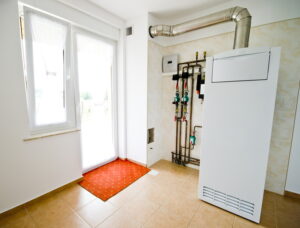 A boiler is an efficient and reliable method of heating a home. But a boiler that’s overheating is a problem that should be checked out immediately when it occurs. Boiler overheating not only results in an inefficient system but presents the serious risk of your boiler exploding. Overheating can also cause the internal components to melt, which can lead to toxic fumes.
A boiler is an efficient and reliable method of heating a home. But a boiler that’s overheating is a problem that should be checked out immediately when it occurs. Boiler overheating not only results in an inefficient system but presents the serious risk of your boiler exploding. Overheating can also cause the internal components to melt, which can lead to toxic fumes.
Although modern boilers are fitted with safety features and warning devices to keep worst-case scenarios like these from happening, as a responsible homeowner, it’s important to recognize the signs of an overheating boiler. Here are some of the main reasons why boilers overheat.
Limescale Buildup
A common cause of overheating boilers is the result of our hard water in Colorado. Hard water causes limescale buildup which can accumulate in your boiler over time. When limescale builds up in the heat exchanger, the flow of water is restricted, causing your boiler to overheat.
Thankfully, your boiler will emit a warning noise similar to a teapot or kettle whistling when its water is restricted. This noise is referred to as “kettling.” If you hear the sound of a kettle and haven’t put the teapot on, contact us to schedule a boiler service to remove the limescale buildup and flush out the system.
System Blockage
Other strange sounds and excessive noises can be strong indicators of a system blockage. These blockages can occur anywhere in the heating system and older systems are more prone to this happening.
Blockages prohibit hot water from circulating throughout the system. If there’s a system blockage, the heat won’t be able to reach your radiators and they won’t heat properly. Power-flushing the system will eliminate any debris, rust, and limescale that could be causing your boiler to overheat.
Faulty Thermistor or Pump
The thermistor is responsible for monitoring the water temperature in your boiler. If the thermistor fails, water temperatures will rise to dangerous levels, causing the boiler to overheat.
A faulty pump can also be problematic. The pump’s job is to circulate water around the system. When the pump malfunctions, hot water remains trapped in the boiler, causing it to overheat. If your boiler is overheating due to a faulty pump or thermistor, our technicians will determine if they can be fixed or if they’ll need to be replaced with new parts.
The Bottom Line
When it comes to an overheating boiler, an ounce of prevention is worth a pound of cure. Scheduling routine boiler maintenance every year will help your boiler run smoothly and efficiently. If your boiler is showing any of these signs of overheating, don’t take any risks when it comes to your home and health by hiring amateurs.
Our experienced heating technicians have the tools and training to properly handle the complex needs of your overheating boiler and get it back up and running in as little time as possible. We offer 24-hour emergency service to ensure you get the repairs your boiler needs.
To schedule your boiler repair service in Colorado Springs and the surrounding area, contact the team at Robbins Heating & Air Conditioning today.
